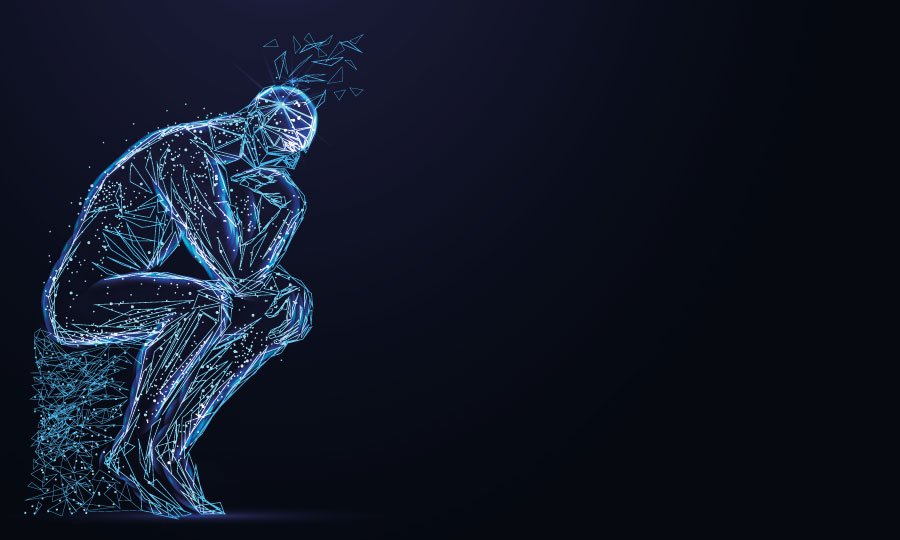Thinking is a constant search to answer the ultimate question of why there is something rather than nothing. Since nothing escapes existence, and there is nothing outside the great chain of being, all thinking is an exercise in existence and its infinite modalities.
In the so-called information age in which we live, we have lost the meaning of the most foundational human activity: thinking. We confuse information with knowledge and think rather deceptively that thinking is processing information.
Thinking is not information gathering. It is not data analysis. It is not simply linking objects to concepts or establishing logical connections between concepts. Thinking involves more than a mental procedure.
Thinking is a constant search to answer the ultimate question of why there is something rather than nothing. Since nothing escapes existence, and there is nothing outside the great chain of being, all thinking is an exercise in existence and its infinite modalities. Whether we conduct a scientific experiment, write a beautiful poem on the morning breeze or analyze modern cities, we are dealing with the various aspects and manifestations of existence.
All thinking must be grounded in existence; otherwise we can never overcome the trap of solipsism. In this sense, thinking is not comprised of the internal workings of my mind. The Cartesian dualism of mind (res cogitans) and world (res extensa) never arises when thinking is rooted in existence. The classical philosophers rejected subjectivism and philosophical skepticism on this ground.
Existence is not an abstract concept. It is the most concrete and most embracing reality. We may picture it as an idea or concept in our minds. But the reality of existence is always more than its mental representations. It is like the difference between a scene and its picture. When we take a picture, we freeze that moment, take it out of its natural state of flow and look at it as a frozen moment. What we look at is not unreal. As a picture, it is not something imaginary. But it is not the reality itself but a picture of it. As it happens in all abstractions, it is now separated from the flow of existence in which it exists. We cannot treat this frozen moment as reality itself. Because reality never stops flowing.
Thinking is an exercise in existence because every mental judgment or logical connection we make is related to existence. This crucial point is underlined by the difference between existence (wujud) and existent (mawjud). Things exist such as a tree, the sky or the house down the street. They have their own unique properties. They are different from each other. Each of them exists in its own way. But they share one thing in common: the act of existing. Or to put in the language of classical philosophy of Mulla Sadra, they all “participate” in existence. It is not the case that existent things make up what we call existence. It is the other way around: existence generates particular beings that exist in their own unique ways. It is existence that flows through all that we see and experience as the world: mountains, animals, humans, the wind, the rain, the cities and all the things that we as human beings create with our own hands. Existence appears in countless modalities and with infinite colors. Existence is more than the sum total of existents.
Just as things (“substances”) partake of existence, we human beings too participate in existence. This participation establishes a special connection between us and existence because we contemplate the meaning of this special relationship.
When we think about an object, a moment, a situation or a relation, we are contemplating existence and its countless manifestation. It is not the case that the world of existence is a passive object with no meaning to which we assign meaning. To the contrary, things are saddled with meaning, purpose, proportion and significance independent of us. The subjectivist turn in Western philosophy has made the world a meaning-less object and the human being a world-less subject. And we are still trapped in this maze. We think that the universe has no meaning without us. We assert with foolish pride and ignorance that existence has no purpose other than serving us. The truth is just the opposite. The world has meaning whether we understand it or not. We are only part of a reality larger than us.
The Muslim philosophers define philosophy as the ability “to know the reality of things as they are to the extent to which it is possible within human capacity.” This definition reveals much about the reality of existence and our relationship to it: Things have their own reality independent of us, and we can try to understand it to the best of our abilities. We do not own the world. We cannot treat existence as a slave. We can only protect and nourish it to realize our own potential. Our relationship to the world of existence cannot be one of domination and exploitation.
Thinking entails developing intellectual, logical and emotional capacities to understand the complex and dynamic reality we call existence. Reducing the world of existence to my mental constructions of it is the deadliest philosophical mistake we can commit. It is only by applying different cognitive perspectives to the multilayered reality of existence that we can begin to grasp its reality and understand our own truth. This means carrying knowledge and thinking beyond calculative reason and discursive analysis.
We have to use our minds as well as hearts to have a proper understanding of the world. Philosophy and logic are important but so are art, poetry and religion. No thinking is meaningful unless it leads to wisdom and shows the ways of how existence unveils itself. Thinking will enrich us only when we realize that we are not the masters of the world but can only be its shepherd and protector.
Source: https://www.dailysabah.com/columns/ibrahim-kalin/2018/10/13/what-is-thinking


